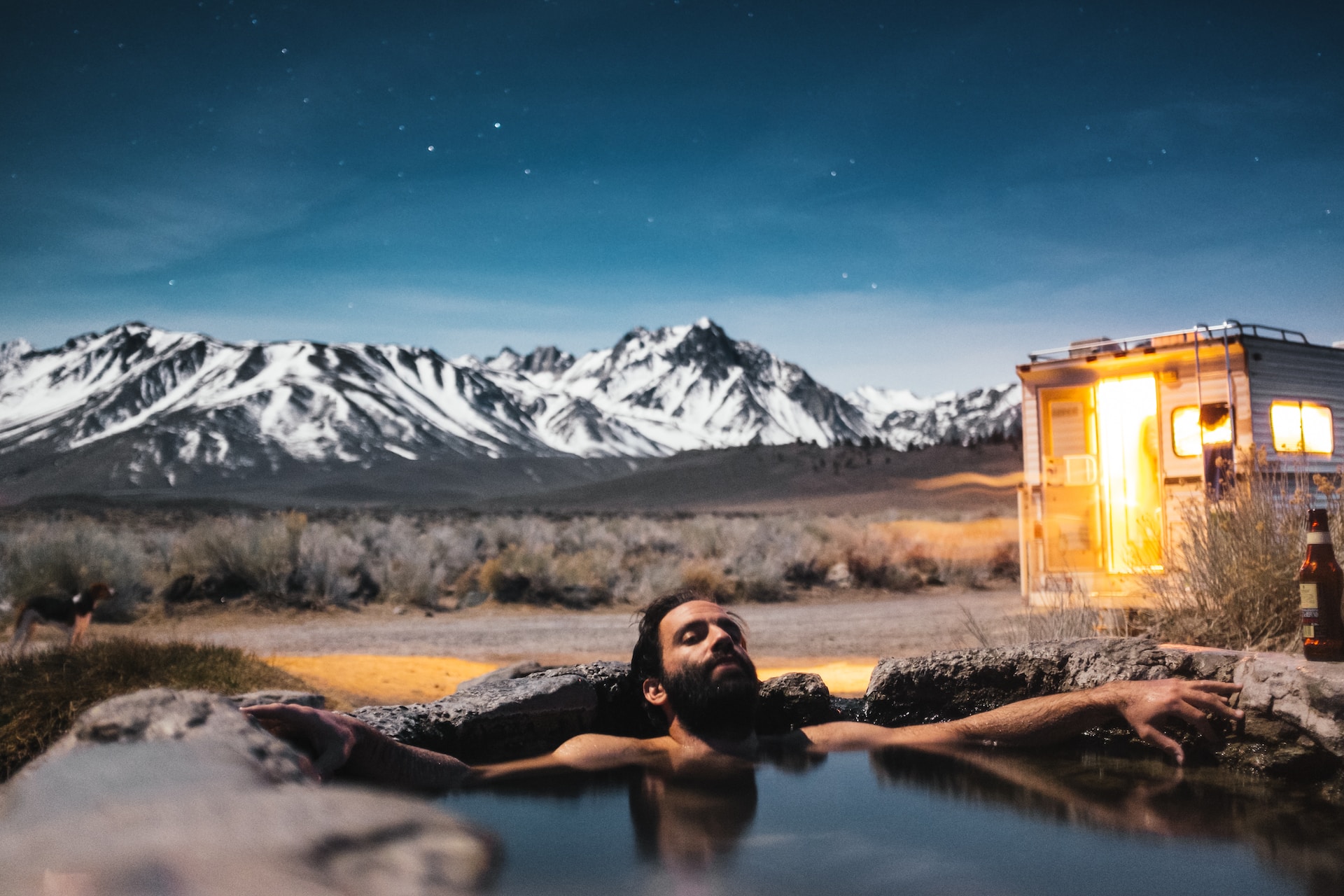
We are reader-supported. When you buy through links on our site, we may earn an affiliate commission.
You’ve done the math and figured you could afford to retire and enjoy life when you reach the young age of 150. Unsatisfied with the odds of making it that long, you’ve decided to quit the insane housing game by taking life on the road. What should you consider before moving into RV living full-time?
This lifestyle promises nonstop adventure if you believe the YouTubers who expound on the glories of permanent glamping. However, it also requires a level of grittiness that those accustomed to city life might struggle to adjust to at first.
There are reasons that this lifestyle is more popular than ever, and while economics is a contributing factor, it’s far from the only one. Still, forewarned is forearmed — here are five things you should consider before moving into RV living full time.
1. Where You Will Park
Boondocking on public lands is glorious — but there are limits. For example, the Bureau of Land Management limits you to a 14-day stay within 28 days. After this time, you must move to another spot at least 25 miles away and cannot reuse the same location for a year. Furthermore, dispersed camping has become more popular lately, and finding the best spaces is getting harder.
“No problem,” you figure, “I’ll just park on the street for a night or two when I head to town to dump my tanks and restock.” Not so fast. Most jurisdictions have strict restrictions against parking campers on public thoroughfares, and some HOAS restrict driveway parking, even if your BFF permits you.
Walmart parking lots used to be a trusty standby, but more and more people parked there overnight have gotten the dreaded “knock” of late, thanks to the increase in homeless families since the pandemic. Some businesses, like Cracker Barrel, still allow overnight parking if you don’t abuse the privilege, and 24-hour locations and some church lots allow an 8-hour stay. Please be respectful and don’t litter or create a disturbance — otherwise, everyone loses the benefit.
If you move into RV living full-time, get used to parking planning taking up much of your time. Avoid headaches by refusing to wing it. Instead, organize your stays month by month so you aren’t stuck behind the wheel of a big rig desperately seeking a place to rest.
2. How You Will Cover Expenses
Many people move to RV living full time because traditional housing is simply too expensive. You need to save up a downpayment of $12,500 and have an income of over $65,000 with little to no additional debt to afford a $250,000 mortgage, and many “starter” homes cost twice that these days. However, life on the road isn’t as cheap as you think.
Let’s look at some of the common costs you will incur:
- Fuel: Your average Class A gets 8 to 12 miles per gallon. A Class B, essentially a camper van, gets 19 to 24.
- Propane: Even if you drop five grand on a sick solar setup, you need backup fuel. Propane costs roughly the same as gas at $3 to $4 per gallon, not including the tank price.
- Maintenance: RV repairs can cost a small fortune if you aren’t handy. Even if you can work a wrench, a new water pump alone costs upwards of $90, and RVs can blow through them like the wind in Chicago.
- Parking fees: Even if you love boondocking, you will sometimes crave campsite conveniences like water and electricity hookups. Such spots aren’t as cheap as they once where, costing anywhere from $35 a night to $80.
- Insurance: You need full coverage if you use your RV as a home.
Of course, you also need to eat and dress, and most full-time RVers appreciate a toy or two to make the most of the lifestyle. The bottom line: you’ll need a job.
3. How You Will Work
Here’s another area to tread carefully. How secure is your work-from-home position? Please avoid the mistakes of many techies who bought homes in remote locations during the pandemic shutdowns only to get the dreaded “return to the office” email.
Many RVs cost roughly the same as a tiny home at $100,000 or more. How much do you trust your boss or your chances of securing replacement telecommuting work if things change?
Finally, remember that you’ll need reliable internet access. Please don’t rely on campsite connectivity — public Wi-Fi hotspots are notoriously unreliable. Fortunately, Starlink now offers a viable satellite alternative that even allows you to type while in transit if your partner drives, but it will set you back a pretty penny for the initial setup and monthly fees.
4. How to Cope With Weather Extremes
Anyone who’s ever slept in their garage after a fight with their partner knows that a vehicle is nowhere near as insulated as a house. Transfer that principle to outdoor temps in North Dakota in January. Likewise, frying an egg on your dashboard might be a fun science trick, but it doesn’t bode well for full-time RV living in Phoenix, AZ, in July.
If you plan to chase the sun, you’ll do fine, other than fuel costs. However, what if you plan on parking on a lot you or someone you know owns as a more or less permanent base camp?
You’ll need to keep your pipes from freezing and heat from corroding your laminate. You should also invest in a skirt for winter and a cover for blocking snow and sun.
5. How to Fix What Breaks
Moving to RV living full-time goes much smoother if you’re mechanically inclined. Otherwise, you could face the unpleasant scenario of getting stranded miles from the nearest road, let alone a AAA-approved shop, with no way to repair your rig.
Your RV toolkit should contain the following items at a minimum:
- A multi-bit screwdriver
- A multitool
- An adjustable wrench
- A socket and ratchet set
- A hammer and mallet
- Allen wrenches
- A bottle jack and lug wrench set
- A multimeter
- Duct tape
- Various pliers
- Zip ties
- Utility knife
- Power tools, including a saw and drill with various bits
- A bubble level
- Assorted nuts, bolts and screws
- Heavy-duty work gloves
- Several flashlights
Additionally, please always carry a well-stocked first aid kit with you. If you’re a boondocker, a basic CPR and first aid crash course can be a lifesaver when you’re far from the nearest paramedic.
6. How to Stay Safe
You love full-time RV living because of the freedom the open road provides. Unfortunately, your gypsy ways put you at risk. Calling the police does little good when it takes 45 minutes over a rough forest road to reach your campsite.
Forewarned is forearmed. Invest in security cameras that let you see the 50-square-foot space surrounding your RV. That way, a simple phone ping alerts you if trouble’s afoot or if Bambi is passing through your campsite. Pair them with motion detector lights — often sufficient to frighten off an inexperienced would-be thief.
Replace your standard lock with a coded version. Why? Far too many people have locked themselves out — or even inside — their rigs. As a result, they leave things unlocked, risking their safety. Punching in a code is far more secure, and there’s no fob to lose on your hike.
What about personal protection? Firearms are a double-edged sword. They can give you a sense of security, but far too many people invest in the weapon without the proper training or a lick of thought about the reality of using it. Please understand that while you might hesitate, a career criminal will not — and a skilled one can turn your pistol against you, given a millisecond of opportunity.
You do have other alternatives, including the following:
- Bear spray: If you camp in bear country, you should carry this anyway. It’s a supercharged version of the pepper spray found in smaller self-defense tools.
- Stun guns and tasers: Some of these require the connection to hit before working, so be careful what model you choose if you don’t have great aim.
- Expandable batons: While these require getting close to an attacker, a swift blow to the head can incapacitate.
Pro-tip: Cover the end with a sock if using a baton-like instrument. Why? It’s not to cushion the blow. If your attacker grabs your weapon, the stocking slides off, giving you extra time to swing away, Merrill, swing away.
Most dogs adore car rides, and RV living suits them fine. If you’re an animal lover, your pup serves as an alarm system and an additional means of self-defense. The sight of a Rottweiler alone might deter a criminal.
Things to Consider Before Moving to Full-Time RV Living
You’ve had enough of the rat race and are considering moving to full-time RV living. Preparing yourself for this new reality ensures a more pleasant experience.
Consider these five things before moving to RV living full time. You can enjoy the freedom of the open road and live on a permanent holiday — if you plan it right.










